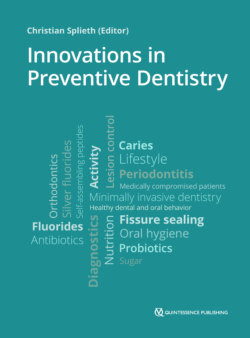Читать книгу Innovations in Preventive Dentistry - Группа авторов - Страница 9
На сайте Литреса книга снята с продажи.
ОглавлениеContents
Preface
Editor
Contributors
Abbreviations
Chapter 1 – Understanding caries
Christian H. Splieth, Mhd Said Mourad, Mohammad Alkilzy, Julian Schmoeckel, Ruth M. Santamaría
Caries epidemiology and its consequences
Early childhood caries
Caries diagnostics
Clinical examination
Caries activity
Further diagnostics
Current concepts and treatment approaches in caries management
References
Chapter 2 – Understanding periodontitis
Daniela Hoedke, Henrik Dommisch
Epidemiology
Etiopathogenesis of periodontitis
Periodontitis in relation to systemic diseases
Clinical features and diagnosis
Prevention and therapy of periodontal diseases
Oral hygiene
Preventive and therapeutic aspects in relation to general health
References
Chapter 3 – Fluoride: How much is needed?
Livia M.A. Tenuta, Line Staun Larsen, Branca Heloisa Oliveira, Ana Paula P. Santos, Carlos González-Cabezas
Fluoride: the mode of action and why it is needed
Fluoride toothpaste: how much fluoride is enough?
Professional fluoride use: mechanism and evidence
Using as much fluoride as needed
References
Chapter 4 – Nutrition and caries: Sugar is the enemy, but what solutions are offered by preventive dentistry?
Cor van Loveren
Shape of the dose-response association between sugar intake and caries
Influence of fluoridated toothpaste
Frequency or amount of sugar
Reduction of sugar content in products
Selective taxation for unhealthy and healthy products
Personal advice
References
Chapter 5 – Healthy life, healthy mouth? Interdisciplinary and common risk factor interventions
Denise Duijster, J. H. (Erik) Vermaire
Determinants of childhood dental caries
The rationale for the Common Risk Factor Approach and interdisciplinary action
Interventions using interdisciplinary partnerships for the prevention of dental caries
Integrated interventions to prevent childhood dental caries and obesity
Integrated interventions to prevent childhood dental caries- and hygiene-related diseases
References
Chapter 6 – Oral hygiene: The best route to a healthy mouth?
Elena Figuero, Irene Dige, Vita Mačiulskienė
Definition of the dental biofilm
Nature of the dental biofilm
How to interfere with the dental biofilm
Clinical effect of biofilm control on dental caries
The role of fluoride
The effect of supervised versus individually performed tooth cleaning
Clinical effect of biofilm removal on periodontal and peri-implant diseases
Self-performed mechanical biofilm control
Chemical biofilm control
References
Chapter 7 – Interdental oral hygiene: To floss, or not to floss?
Falk Schwendicke, Christian H. Splieth
The evidence for flossing
The evidence for interdental brushes
Clinical considerations
References
Chapter 8 – Tooth brushing: Myth and science
Stefan Zimmer
Classic criteria of a manual toothbrush
Production of toothbrushes
Evidence-based criteria for manual toothbrushes
Manual toothbrushes for children
Tooth brushing technique
Tooth brushing time
References
Chapter 9 – Guidance for healthy dental and oral behavior: Multilevel prevention of early childhood caries
Julian Schmoeckel
How do we learn: different theories
Ethical considerations in modern patient-doctor relationships
Health literacy and belief in self-efficacy
Evidence of different aspects in counseling for preventing ECC
Access to children: prevention on individual, group, and collective level
References
Chapter 10 – Fissure sealing: Still to be recommended?
Kim R. Ekstrand, Azam Bakshandeh, Christian H. Splieth
Caries progression on occlusal surfaces
Preventive and therapeutically placed fissure sealants
Effectiveness of fissure sealants
Clinical application
From science to clinical recommendations
References
Chapter 11 – Prebiotics, probiotics, and synbiotics: A revolution in preventive dentistry?
Svante Twetman, Jukka H. Meurman, Egija Zaura
Oral prebiotics
Oral probiotics
Oral synbiotics
References
Chapter 12 – Silver fluorides: The new magic bullet?
Mohamed H. Abudrya, Christian H. Splieth, Ruth M. Santamaría
Historical background
Composition
Mechanism of action
Indications
Contraindications and side effects
Clinical application
Existing evidence
References
Chapter 13 – Self-assembling peptides: A perfectly engineered preventive and therapeutic tool?
Mohammad Alkilzy, Christian H. Splieth
Self-assembling peptide P11-4
In vitro studies
In vivo and clinical studies
Clinical application of P11-4 for treatment of initial caries
Further clinical implications of SAP
References
Chapter 14 – Nonrestorative cavity control: Can nonoperative “preventive” treatment replace restorations?
Ruth M. Santamaría, Nicola Innes
What is nonrestorative cavity control?
Natural history of dental caries
Prevention as a desirable approach to managing dental caries
Historical management of caries lesions
Is restorative management always necessary or possible?
How to carry out NRCC
What is the aim of NRCC?
For which patients is NRCC indicated?
NRCC technique
What are the main advantages of NRCC?
What are the main disadvantages of NRCC?
Is taking an NRCC approach cost-effective?
Is taking an NRCC approach clinically effective?
References
Chapter 15 – Prevention and prophylaxis in orthodontics: Neglected opportunities for successful prevention
Karl-Friedrich Krey, Anja Ratzmann, Nadezhda Stancheva
Etiology of malocclusion and malfunction as the basis of prevention
Form follows function
The beginning of orthodontic prevention
Breastfeeding, swallowing, and chewing
Habits and malfunctions
Playing musical instruments
Premature loss of primary molars and space maintainers
Canine retention
Unilateral reverse articulation
Anterior reverse articulation and periodontal health
Caries
Sleep disorders and upper airway management
Trauma prevention
Temporomandibular disorders
Third molar removal as prevention of crowding
Orofacial clefts
References
Chapter 16 – Prevention in elderly and medically compromised patients
Murali Srinivasan
Demographics of aging: related effects and retention of natural teeth
Periodontal disease and root caries
Prevention of periodontal disease
Prevention of root caries
References
Chapter 17 – Caries risk or activity: Which should we assess?
Margherita Fontana, Ruth M. Santamaría
Caries risk assessment
Caries activity
References
